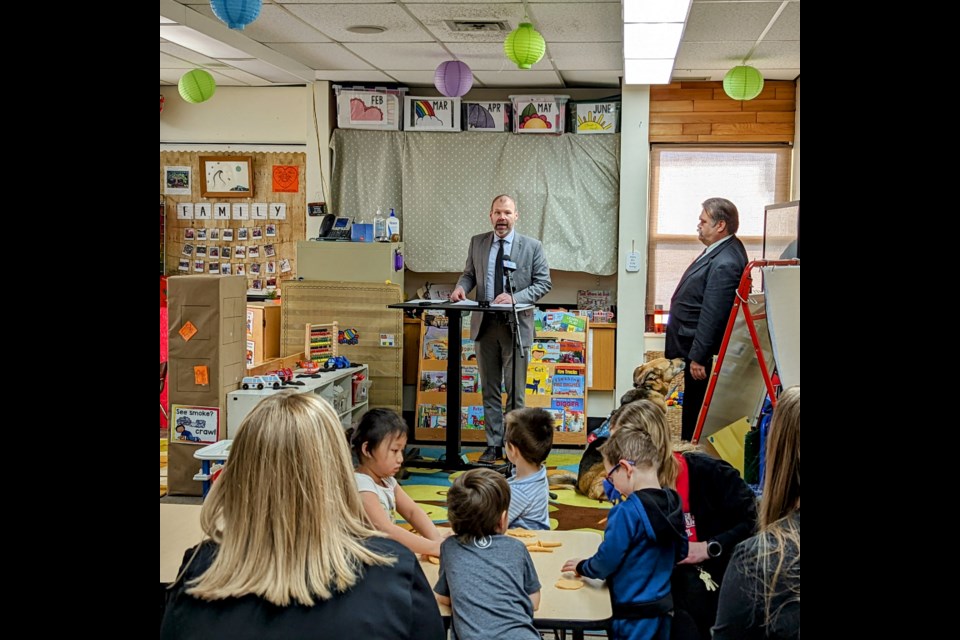Minister of Education Dustin Duncan visited King George School in Moose Jaw on Nov. 24 to announce the expansion of the province’s Early Learning Intensive Support (ELIS) program, which will now support an additional 150 preschool-aged children for the 2022-23 school year.
The ELIS program is for three- and four-year-olds with significant, enduring disabilities and developmental delays.
Greg Lawrence, MLA for Moose Jaw Wakamow, was the emcee for the announcement. Also in attendance was Ryan Boughen, director of education with Prairie South School Division (PSSD), Amanda Olson, PSSD superintendent of learning, and Jill Tressel, principal of King George School.
The announcement was held in pre-kindergarten teacher Hannah Delainey’s classroom, and Lawrence thanked Delainey for hosting the event.
“We’re gathered here today to share some exciting news about the Early Learning Intensive Support program, also known as the ELIS program, here in Saskatchewan,” Lawrence said. “This program is active here at King George School and it provides a high-quality early learning experience for children to get a good start in life and help ensure that they reach their full potential.”
The ELIS program was first piloted in 2018 with 120 spaces in Regina and Saskatoon. It was expanded in 2019 and 2020 to include additional communities.
Today’s announcement brings the number of spaces in the province to 392.
“This program has been an enormous help to my son,” said parent Kayla Haanen. “Prior to this program, he had little to no experience in settings where he was given opportunities to interact with children his own age.
“This lack of experience combined with the social deficits that my child is faced with have created barriers that he would have had to overcome while trying to transition into fulltime school days entering into kindergarten and grade one.”
Haanen added that she was pleased to see two additional afternoon spaces at King George School specifically, as she felt more families could benefit from ELIS.
Boughen spoke on behalf of PSSD to thank the province for the expansion. He noted that the ELIS program has been a tremendous benefit everywhere its been implemented, and praised the more inclusive learning resulting from the program.
Senior program and policy analyst Debbie Thompson, a subject matter expert with the ministry of education who has been with the ELIS program from the start, said the program now exists in 26 school divisions in Saskatchewan.
“With this program, there’s funding for an additional staff in the classroom, to ensure safety ratios,” Thompson explained. “There’s also some funding for specialized services, so … some divisions are using it for speech and language support, or occupational therapy, or an expert teacher who has experience in inclusionary practices.”
“Supporting our youngest learners is essential to their success in their future education paths,” Duncan said. “We are pleased to continue to support and increase the availability of the ELIS program to more preschool-aged children across the province.
“The (ELIS program) expansion to bring it up to nearly 400 spaces is an additional $2 million, that brings it up to $5 million in total.”
This funding is made available through the Canada-Saskatchewan Bilateral Early Learning and Child Care Agreement 2021-26, signed on August 13, 2021.
Lawrence told media following the event that he remembered being hyperactive in school, and his teachers simply doing their best to distract him.
“Then there was a separate classroom for the kids with special needs,” he recalled. “Now everybody’s integrated together with the No Child Left Behind program, and it’s just better for growing the kids.”
Haanen said that while her son is enrolled in private therapies as well, those therapies cannot recreate the unique experiences and situations that come from being among peers.
“The ELIS program has also provided the other children in the classroom the opportunity to be exposed to my children and other children with different or higher needs than they may have, or are used to.
“I believe that was extremely important to getting my son integrated with his peers.”




